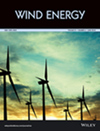投稿信息
投稿信息
审稿周期
投稿命中率
审稿费用
暂无数据
版面费用
暂无数据
中国人发表比例
2023年中国人文章占该期刊总数量暂无数据 (2022年为100.00%)
自引率
15.5 %
年文章数
1486
作者需知
暂无数据
NCBI查询
偏重的研究方向
暂无数据
期刊简介
稿件收录要求
稿件收录要求
Wind power is set to become one of the major energy resources of the future. Wind Energy offers a major forum for the reporting of advances in this rapidly developing technology with the goal of realising the world-wide potential to harness clean energy from the wind. The journal will aim to reach all those with an interest in this field from academic research industrial development through to practical applications of wind turbines. Contributions across the spectrum of scientific and engineering disciplines concerned with the advancement of wind power conversion technology are an essential feature of the journal. Considerable emphasis will be placed on technical applications papers which describe progress in a way which will appeal to a wide readership. The scope extends to include contributions of a more general nature addressing operating experience environmental studies economic aspects and sociopolitical issues in a 'Broader Perspectives' section. The international Editorial Board presiding over the journal plays an essential role in the rigorous peer-reviewing of contributions to ensure delivery of high-quality and useful information. Principal Topics Wind rotor technology - aerodynamics aeroacoustics wakes blade design. Structural and mechanical engineering of wind power - drive trains hydraulics fluid mechanics and mechanical components. Electrical engineering of wind power - electrical components power electronics and controls generators grid connection power transmission and distribution. Dynamics and control - materials fatigue testing reliability and certification. Resource assessment - prediction modelling wind farm planning siting (including off-shore developments) economics and environmental issues. Systems - design installation operation performance optimisation and control; small hybrid and autonomous systems and applications other than grid connection such as desalination water pumping and heating.




